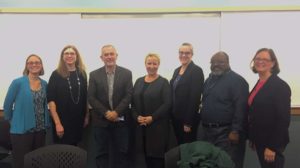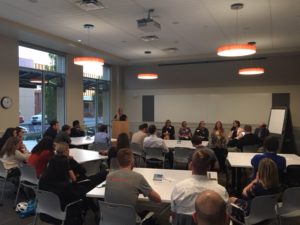I pride myself on being a straight-forward person, as such, I “call things like I see ’em” so to speak. I do not support waste in any system. Just ask my husband, who laughs every time I pull out the device that squeezes the last bit of tooth paste out of the container. Generally speaking, I think our public utility system works and I think the lack of community attendance at EWEB meetings supports that theory. People usually only get activated when something is wrong, or they have ideas on how to improve the system. However, I have heard from some residents that they haven’t been involved because they feel disenfranchised by the system or didn’t know that EWEB was publicly owned and that they even had a say. I hope to change that. I am actively reaching out to residents to give them a voice.

As I have been out knocking on doors, participating in Town Hall Meetings, and attending neighborhood meeting, most community members have nothing to say about EWEB because the system meets their needs and they don’t have to worry about it. The way it should be. On the other hand, I have heard concern from citizens about certain issues that warrant attention. The most common concern noted involves rates.
Rate Reform Challenges – Disruptive Technologies, China, and Efficiency Programs: Fracking for natural gas has flooded the market driving energy prices down. China’s economic slowdown has caused demand for energy products to decline further lowering energy prices. Low energy prices seem like a good thing and generally have been saving people money, however, EWEB had been selling excess energy into the wholesale market or “the grid” for a much higher price. This extra revenue helped keep our rates lower. Now there is pressure to increase rates to cover this lost revenue. Furthermore, as solar costs dramatically decline, residents are opting to install their own solar panels. This distributed energy, while good for resiliency, has reduced demand for power from utilities like EWEB. As more people in Eugene opt to generate their own power, they purchase fewer kilowatt hours from EWEB. EWEB pays for fixed investment costs through the rates we pay. This means that spreading the same fixed cost over fewer kilowatt hours puts upward pressure on rates. Furthermore, efficiency programs that directly save individual homeowners money and indirectly benefit all rate-payers by reducing the need for costly new investments in generation capacity are good long-term policy. However, as the system becomes more efficient, the fixed costs of previous investments are again spread over fewer kilowatt hours. This further puts upward pressure on rates and is challenging for a utility that has to pay its bills just like you and I. Even with those pressures we have held Eugene city residential rates constant and absorbed 2.5% rate hikes from our largest energy provider, the Bonneville Power Administration.
Many people compare EWEB rates to the rates of the Springfield Utility Board (SUB). To some extent that comparison isn’t fair as SUB is a smaller system and thus isn’t subject to the same regulations. One particular regulation, that I support, is the renewable portfolio standard. According to EWEB staff, when this legislation was passed by the legislature in 2007, EWEB, didn’t lobby against it even though compliance costs would rise, because it was believed that customers were supportive of that transition. Support for a clean energy future isn’t entirely surprising given that polls recently showed 70% of Oregonians supported banning coal in the state.
What can EWEB do to impact rates? In part, EWEB, can make sure that investment decisions rely on worst case scenarios to shield against disruptive technologies. EWEB should work to protect the most vulnerable rate payers by setting rates that reflect usage and should strategically target efficiency programs and grants.

Other Challenges: I have also heard about other issues. For example: information about back-flow charges, declining infrastructure, storm water charges in areas with no sewer, large unexpected costs when systems break on the customer side, investments not meeting expectations, customer engagement and service. If re-elected, I intend to explore solutions and refinements that could make these systems more transparent and convenient for customers. However, I am not committing to wholesale change for change’s sake. I don’t make promises I don’t intend to keep and being able to commit to reforming a system requires significant analysis and access to information about the barriers, costs, and regulations. Could certain systems and policies be improved? If elected, that is what I intend to thoughtfully analyze. I welcome feedback and ideas from citizens. Let’s work together to build a system that works for our community.
Moreover, I think that EWEB policies should be prioritized based on community values and that those values should be weighed against our willingness and ability to pay. We have high rates of poverty, seniors and disabled living on fixed incomes, and vulnerable families struggling with low wages and high costs of childcare. Vulnerable populations always have to be at the crux of the decision-making process. I lived in a trailer park until I was 15 and understand the challenges of living on a constrained budget. I have worked hard and diligently to get to where I am today and believe that I bring a fresh perspective. I want to actively seek ways to build partnerships within the community and would be honored to be your choice for EWEB Commissioner.
EWEB has programs in place that help our local businesses thrive. I support these programs to the extent that they help bring living-wage jobs and are fairly and equitably dispersed. While the scope of an EWEB Commissioner is generally more narrowly focused on electricity/water issues, I believe that the reputation of our K-12 education system is the single largest barrier to recruiting, growing and maintaining existing businesses. We are a university town with significant creative and intellectual capital, yet we struggle to support basic services in our K-12 school system. When I moved to Oregon 15 years ago, I was appalled to find out how large the class sizes are and spent 5 years in Salem fighting for improvements in K-12 funding. Additionally, it is disheartening that 4-J schools only get gym and art half the year. These are the type of programs that keep students energized to learn the other more academic subjects. Our students also need hands-on training in skills such as computer coding, machine operation, robotics which keep students involved so that they can learn other life skills such as balancing a checkbook, civic engagement, and being able to cook themselves a meal. I would use my “elected-official hat” to advocate for policies that support needed funding and reorganization.